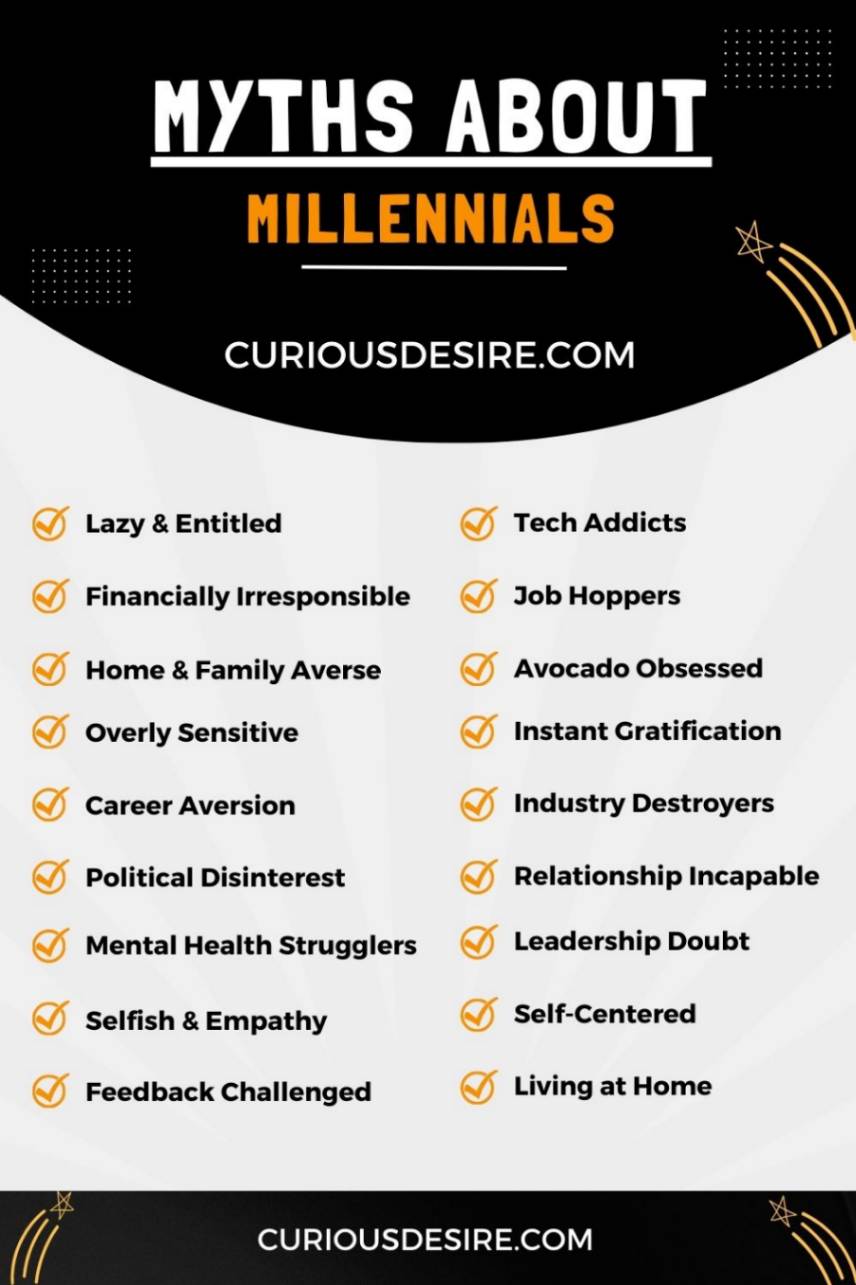Millennials, as the largest generation in history, hold significant influence over various aspects of society, from the economy to culture and beyond.
However, they have often been the subject of misconceptions and stereotypes that overshadow their true impact. Understanding millennials is important not only for businesses and organizations but for society as a whole.
In this article, we aim to debunk 20 common myths about millennials, shedding light on their true characteristics and contributions.
By debunking these myths, we hope to promote a more accurate understanding of millennials and recognize their importance in shaping the present and future landscape.
Here are the 5 common myths about millennials:
- Millennials are lazy and entitled.
- Millennials are addicted to technology and social media.
- Millennials are financially irresponsible and unwilling to save money.
- Millennials are job hoppers, lacking loyalty to their employers.
- Millennials are all about instant gratification and lack patience.

Myth 1: Millennials are lazy and entitled
This myth often comes from observations of millennials seeking a balance between work and personal life and valuing experiences over traditional career paths.
Some may perceive this behavior as laziness or entitlement, believing that millennials expect success without putting in the effort. However, the reality is that millennials face unique challenges such as economic instability and high levels of student debt.
Many are ambitious and hardworking, but they prioritize different aspects of life, such as personal fulfillment and social impact, over traditional notions of success.
For example, a millennial might choose to pursue freelance work or start their own business to have more control over their time and pursue their passions, rather than conforming to traditional corporate structures.
Myth 2: Millennials are addicted to technology and social media
This myth stems from the ubiquitous presence of smartphones and social media in millennials’ lives.
Observers often interpret millennials’ reliance on technology as addiction, overlooking its multifaceted role in their daily activities.
While some millennials may struggle with excessive screen time, it doesn’t reflect the habits of an entire generation. Technology serves various purposes for millennials, including communication, entertainment, and work.
They understand the importance of face-to-face interactions and know when to disconnect to focus on other aspects of life, such as hobbies or relationships.
For instance, millennials might use social media to stay connected with friends and family, network professionally, or stay informed about current events.
Myth 3: Millennials are financially irresponsible and unwilling to save money
The existence of this myth likely arises from misconceptions about millennials’ spending habits, particularly their preference for experiences over material possessions.
Critics often view their lifestyle choices as indicative of financial irresponsibility. Despite economic challenges like stagnant wages and rising living costs, many millennials are proactive about managing their finances.
They prioritize saving for the future while still enjoying life in the present. For instance, a millennial might create a budget that allows for occasional splurges on dining out or traveling while contributing to savings accounts or retirement funds.
Myth 4: Millennials are not interested in buying homes or starting families
Observations of millennials delaying traditional milestones like homeownership and marriage fuel this myth. Critics perceive millennials as disinterested in settling down, attributing their lifestyle choices to a lack of commitment or interest.
Economic factors such as high housing costs and student loan debt play a significant role in millennials’ decisions to delay homeownership and starting families.
They prioritize financial stability and personal fulfillment before committing to these significant life decisions.
For example, a millennial might delay purchasing a home to save for a larger down payment or advance their career before starting a family, demonstrating a strategic approach to achieving their long-term goals.
Myth 5: Millennials are job hoppers, lacking loyalty to their employers
This perception arises from the observation that millennials tend to change jobs more frequently than previous generations. Critics interpret this behavior as a lack of commitment or loyalty to their employers.
Millennials prioritize career growth, personal development, and meaningful work over long-term loyalty to a single employer.
They are more likely to seek new opportunities that align with their values and offer better prospects for advancement.
For example, a millennial might leave a job with limited opportunities for growth to pursue a role that offers more challenging projects or a better work-life balance. This behavior reflects their desire for career fulfillment rather than a lack of loyalty.
Myth 6: Millennials are all obsessed with avocado toast and expensive coffee
This stereotype originates from media portrayals of millennials as indulging in trendy, high-priced food and beverages. Critics often use this stereotype to portray millennials as financially irresponsible and out of touch with reality.
While some millennials may enjoy avocado toast and specialty coffee, it’s unfair to generalize an entire generation based on their food preferences.
Many millennials are financially savvy and prioritize budgeting for necessities while indulging in occasional luxuries.
This stereotype overlooks the diverse spending habits and priorities of individuals within the millennial generation.

Myth 7: Millennials are all about instant gratification and lack patience
This myth stems from observations of millennials seeking immediate results and instant solutions in various aspects of life. Critics interpret this behavior as a lack of patience and perseverance.
Millennials value efficiency and convenience, but it doesn’t necessarily mean they lack patience or perseverance. They understand the importance of working towards long-term goals and are willing to put in the effort to achieve them.
For example, a millennial might pursue further education or training to advance in their career, demonstrating patience and dedication to their professional development.
This myth overlooks millennials’ ability to balance the desire for immediate results with the patience required to achieve meaningful long-term success.
Myth 8: Millennials are overly sensitive and require constant validation
Contrary to the myth, millennials are not universally hypersensitive. They are, however, more vocal about issues such as mental health and workplace inclusivity, which can be misconstrued as sensitivity.
Millennials prioritize environments where they feel valued and respected, prompting discussions around empathy and emotional well-being.
This myth often originates from misunderstanding millennials’ emphasis on emotional intelligence and inclusivity.
Some perceive their openness about mental health and social issues as excessive sensitivity, overlooking the importance of creating supportive work cultures.
A millennial advocating for diversity and inclusion initiatives in their workplace might be labeled as overly sensitive. However, their actions reflect a desire for a more inclusive environment, which benefits not only millennials but the entire workforce.
Myth 9: Millennials are not interested in traditional forms of work or career advancement
While millennials may approach work differently, they are still ambitious and seek career advancement. They value flexibility, purpose-driven work, and growth opportunities.
Millennials are inclined towards workplaces that offer professional development, mentorship, and a conducive work-life balance.
This myth arises from observations of millennials prioritizing work-life balance and seeking non-traditional career paths. Some interpret this as a lack of ambition or interest in career advancement, ignoring millennials’ desire for meaningful work.
Millennials may opt for freelance or remote work to pursue their passions while maintaining autonomy over their schedule. Despite deviating from traditional career paths, they actively seek opportunities for skill development and advancement in their chosen field.
Myth 10: Millennials are destroying industries like the housing market or traditional retail.
Millennials are not intentionally destroying industries but rather reshaping them through their preferences and purchasing habits. Their adoption of new technologies and preferences for experiences over material possessions drive changes in industries like retail and housing.
This myth emerges from observations of millennials’ shifting consumption patterns and preferences. Critics attribute declines in certain industries to millennials’ behaviors, overlooking broader economic and societal factors at play.
For instance, the rise of e-commerce and the preference for the urban living among millennials have impacted traditional retail and the housing market. However, these changes reflect shifting consumer preferences and technological advancements rather than millennials’ destructive tendencies.
Myth 11: Millennials are not interested in politics or civic engagement
Contrary to popular belief, millennials actively participate in political and civic affairs, although it is often achieved through unconventional methods.
While they may not engage in conventional forms of political activism like attending rallies or joining political parties, they leverage digital platforms to express their views and effect change.
Social media serves as a powerful tool for millennials to mobilize and advocate for causes they believe in, whether through online petitions, viral campaigns, or community organizing efforts.
Their involvement in grassroots movements and social justice initiatives demonstrates a deep-seated commitment to shaping society and making a positive impact, challenging the notion that millennials are apathetic towards politics and civic engagement.
Myth 12: Millennials are not capable of forming deep, meaningful relationships
Despite the prevalence of digital communication, millennials value authentic connections and meaningful relationships.
While they may rely on social media and digital platforms for communication, they prioritize quality over quantity in their relationships.
Millennials invest time and effort in nurturing close friendships, familial bonds, and romantic partnerships, seeking emotional support and companionship in their social circles.
They engage in meaningful conversations, share experiences, and support one another through life’s challenges, debunking the myth that millennials are incapable of forming deep, meaningful relationships.
Myth 13: Millennials are all struggling with mental health issues
While mental health issues are prevalent among millennials, not all members of the generation experience them, and many actively seek help and support.
Millennials prioritize self-care practices such as therapy, mindfulness, and exercise to maintain their mental well-being and cope with stressors in their lives.
They are increasingly open about their mental health struggles, seeking to reduce stigma and promote understanding in society.
By advocating for mental health awareness and supporting one another, millennials demonstrate resilience and strength in addressing mental health challenges.

Myth 14: Millennials are not interested in or capable of leadership roles
Millennials exhibit leadership qualities such as
- Adaptability: Millennials adjust quickly to change and embrace new technologies.
- Innovation: They generate creative ideas and solutions, pushing boundaries.
- Collaboration: Millennials excel in teamwork, valuing diverse perspectives.
- Communication: They communicate effectively through various channels.
- Empathy: Millennials understand and support others’ perspectives and emotions.
- Vision: They articulate clear goals and inspire others with their passion.
- Resilience: Millennials bounce back from setbacks, viewing failure as a learning opportunity.
- Ethical Leadership: They prioritize integrity and social responsibility in decision-making.
Many millennials excel in leadership positions, leveraging their diverse perspectives and technological savvy to drive innovation and promote inclusive workplace cultures.
They prioritize mentorship, team-building, and empathy in their leadership styles, challenging traditional notions of hierarchy and authority.
By embracing leadership opportunities and advocating for positive change, millennials are reshaping the landscape of leadership in the modern world.
Myth 15: Millennials are selfish and lack empathy
This misconception overlooks the depth of millennials’ social consciousness and their efforts toward promoting empathy within society.
Millennials frequently engage in various forms of activism, from advocating for marginalized communities to championing environmental sustainability.
Their involvement in volunteer work and philanthropy demonstrates a genuine concern for the well-being of others.
Additionally, millennials are often at the forefront of promoting inclusivity and understanding, actively challenging stereotypes and biases.
Their empathy-driven actions reflect a generation deeply committed to creating a more compassionate and equitable world.
Myth 16: Millennials are only concerned about themselves and not the greater good
Despite accusations of self-centeredness, millennials display a remarkable dedication to addressing pressing societal issues and advancing the common good.
They are deeply invested in causes ranging from poverty alleviation to climate change mitigation, leveraging their collective power to effect positive change.
Millennials actively participate in community initiatives, engage in advocacy efforts, and support charitable organizations.
Their commitment to social responsibility and collective well-being highlights a generation that prioritizes the welfare of others and actively works towards creating a more just and sustainable future for all.
Myth 17: Millennials are unable to handle criticism or feedback
While millennials may be perceived as sensitive to criticism, this characterization overlooks their receptiveness to constructive feedback and their dedication to personal growth.
Millennials value continuous learning and improvement, recognizing the importance of soliciting input from others to enhance their skills and performance.
They actively seek out mentorship and coaching opportunities, demonstrating a willingness to learn from others’ perspectives and experiences.
Millennials view criticism as a valuable tool for self-reflection and development, leveraging it to refine their abilities and achieve their goals.
Myth 18: Millennials are all living with their parents because they’re lazy
This stereotype fails to consider the complex economic realities and societal factors influencing millennials’ living arrangements.
Rising housing costs, coupled with high levels of student loan debt and stagnant wages, present formidable obstacles to achieving financial independence.
Additionally, cultural shifts and changing family dynamics may contribute to millennials choosing to live with their parents for practical reasons.
Many millennials actively seek employment and pursue educational opportunities while handling challenging economic conditions.
Labeling an entire generation as lazy based on their living situation overlooks the determination and resilience demonstrated by millennials as they strive to establish themselves in an increasingly competitive world.

Myth 19: Millennials are unable to disconnect from technology and be present at the moment
This perception stems from the ubiquitous presence of smartphones and digital devices in millennials’ lives.
While it’s true that millennials are highly connected to technology, it doesn’t necessarily mean they are allowed to disconnect or be present at the moment.
Many millennials actively practice mindfulness and seek to balance their digital engagement with offline activities.
They recognize the importance of disconnecting from screens to focus on meaningful interactions, hobbies, and experiences.
Additionally, some millennials use technology intentionally to enhance their present moments, such as capturing memories through photos or using mindfulness apps to manage stress and promote well-being.
Myth 20: Millennials are all about experiences and don’t value material possessions
This stereotype arises from observations of millennials prioritizing experiences such as travel, dining out, and attending events over acquiring material possessions.
Instead, they often seek meaningful experiences that contribute to personal growth, create lasting memories, and promote connections with others.
Millennials may prefer spending money on experiences because they perceive them as more fulfilling and enriching than material possessions.
However, they still appreciate the value of material items that hold sentimental or practical significance in their lives.
Ultimately, millennials prioritize a balanced approach to life, valuing both experiences and material possessions based on their individual preferences and values.
Conclusion
In conclusion, the myths surrounding millennials often paint an inaccurate picture of this diverse and dynamic generation.
By examining and debunking these misconceptions, we’ve highlighted the true qualities and contributions of millennials.
It’s important to move past stereotypes and embrace a more nuanced understanding of millennials, recognizing their valuable perspectives, strengths, and potential.
By doing so, we can promote better communication, collaboration, and inclusion across generations, ultimately creating a more cohesive and productive society for all.
Myths About Millennials FAQs
1. Why do people believe millennials are lazy and entitled?
People perceive millennials as lazy due to differing work-life balance priorities, but many are hardworking despite economic challenges. This stereotype overlooks millennials’ ambition and resilience in navigating today’s complex job market.
2. What fuels the myth that millennials are addicted to technology?
Widespread smartphone and social media use contributes to the perception, although many millennials value offline interactions. Their reliance on technology is often balanced with efforts to disconnect and be present in the moment.
3. Why are millennials often considered financially irresponsible?
Preference for experiences over possessions may lead to this perception, yet many millennials actively manage their finances. While they prioritize enjoying life, they also understand the importance of saving and planning for the future.
4. What leads to the misconception that millennials aren’t interested in homeownership or starting families?
Economic factors delay these milestones for some, but many prioritize financial stability before committing. Millennials value independence and are willing to delay these traditional markers until they are financially prepared.
5. Why are millennials labeled as job hoppers?
Job changes may be frequent, driven by a desire for growth and fulfillment rather than disloyalty. Millennials seek opportunities that align with their values and offer avenues for personal and professional development.
6. What perpetuates the myth that millennials are overly sensitive and require constant validation?
Increased discussions about mental health may contribute, but millennials prioritize empathy and inclusivity. They are vocal about their struggles to promote understanding and create supportive environments for all.
7. Why do some people believe millennials are selfish and lack empathy?
Misunderstandings about self-care may fuel this belief, yet many millennials engage in social activism. They are passionate about making a positive impact on society and demonstrate empathy through their actions.
8. What contributes to the idea that millennials are unable to handle criticism or feedback?
Valuing positive reinforcement may influence this perception, but many seek feedback for personal growth. Millennials understand the importance of constructive criticism and use it as a tool for continuous improvement.